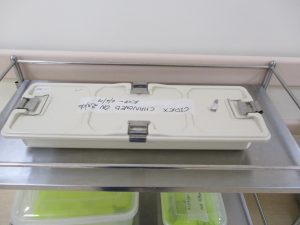Sterilization of bronchoscopy and disinfection reduces the risk of infection and infiltration of microorganisms, but not the active bacteria and viruses. Fiber optic bronchoscope disinfection with 2% glutaraldehyde and peracetic acid
Sterilization kills all microbes including spores and viruses
see here for the process of sterilization
The Fiberoptic Bronchoscope instruments sterilized to reduce the infection.
The Temperature must not exceed the 65° C for the Fiberoptic scopes and instruments
Ethylene oxide sterilization satisfaction in the mean of fiber optic bronchoscope. The chemical and ETO sterilization acceptable in these instruments
Other types like steam sterilization and Autoclaving are contraindicated. Only chemical Sterilization methods widely using and acceptable in this type of instrument.
2% Glutaraldehyde
The most widely used chemical solution used for the sterilization process
The solution may irritant the eye, skin, and respiratory tract. It affects both the patients and healthcare workers
The safe use of the solution in preferred trays and containers incorrect heights and trolley.
The personal protective equipment (PPE) reduces the risk of solutions
Following certain precaution and protocol helps in the safe use of the solution
Checking the duration of use and expiry periodically enhances the best result in sterilization The activated solution must be discarded according to the hospital guidelines and policies.
The duration to use the solution is to be followed by the manufacturer advice
Peracetic acid
The solution Peracetic acid-activated before use with the powder dissolved in Normal water with 35°C temperature
The blue color solution with an acetic odor. The solution irritant to eye and skin, wearing the personal protective equipment reduces the risk of infection
Handle solution with the gloved hand and protective eye goggle. The solution shelf life is 24 hours from the time of activation
The powder is anti-corrosive material
Tips for better use
Each cycle for sterilization of bronchoscopy and disinfection with 2% glutaraldehyde makes 10 minutes time.
The cleaning of fiber optic solution using sterile water flush and suction
Always keep ready with disinfection solution in a tray in the anesthetic room
The solution properly closed and labeled with the name of the solution, date of preparation and date of expiry
The Fiberoptic endoscope cleaned and disinfected at the beginning and end of each procedure
Remove the suction stopcock cap and irrigation valve port before disinfection
Immerse fully the fiberscope into the tray for a good result
After 10 minutes of time, remove it from the tray and clean with sterile water, then flush it with the sterile water in the irrigation port
Clean suction valve and cap in water
Perform suction to remove all the disinfectant solution and debris from the channel
Care, cleaning and disinfection of fiber optic equipment
sterilization of Bronchoscopy following manufacturer’s guidelines increases the life of the equipment. The fiberoptic bronchoscope is fine and flexible equipment need more can maintenance.
Costly equipment needs more care. The anesthesia assistant/Technologist taking care of this equipment
The lenses and fiber optic bundles are fine and delicate need more attraction. This needs the proper training and experience in bending fiber-optic channel results in breaking fiber optic fibers
Proper checking before use and after use must be followed before and after use.
Periodical checking and inspection of equipment increase the quality of the team. The Bite blocker applied to the patient before the procedure. The bite block or mouth gag protects the fiberoptic scope from damage by the patient’s tooth. Fiber optic bronchoscopy hung by the proper dedicated cupboard or suitcase.
For transport, purpose use a suitcase with appropriate sponge block to keep the bronchoscope
Leakage test
The test performed using leakage tester for better use and to check leaked in whole channels